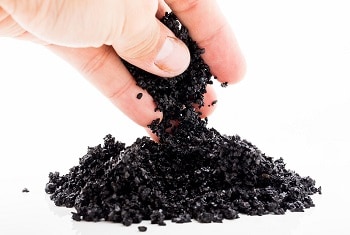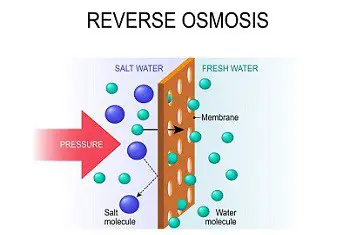UPDATED: October 17, 2022
You watch what you eat to make sure that you are getting the healthy vitamins and minerals that your body needs without getting too much of the minerals that you try to avoid in your diet like sodium. You even use a Brita water pitcher to improve your drinking water, but does a Brita water filter help to remove salt from your drinking water?
A Brita water filter does not contain sodium filtering media or a reverse osmosis membrane to remove sodium from your water. The activated charcoal, ion exchange resin, and sediment screen contained in a Brita water filter are not for the removal of sodium from your water.
A Brita water filter is great for removing chemicals, organic impurities, calcium, and other impurities from your water that can cause your water to have unpleasant tastes and foul odors. But sodium is a very small dissolved solid that needs to be removed by a fine water filtering membrane, like one found in a reverse osmosis system.
What is in a Brita water filter and why don’t they remove sodium?
Brita water filters work great for what they are intended for but Brita water filters simply do not have the correct type of filtering capability that is required to remove sodium from your water.
A Brita water filter contains mostly activated carbon. Activated carbon is able to filter chemicals by trapping the small chemical particles inside the pores on the surface of the carbon grains.

This works great to remove tiny particles that can get caught in the pores of carbon, but solids that are dissolved in the water will flow in and out of these pores without getting trapped in the pores.
Check Out This Quick Video About How A Brita Filter Works.
Sodium ions are far too small to simply get lodged in the pores of carbon grains and there is no filter inside of a Brita water filter that is fine enough to capture tiny sodium ions and if there were one, it would not be able to effectively remove sodium for very long because the sodium ions would clog the filter rather quickly.
Filtering sodium ions from your water requires a very fine filter known as a membrane which is what is used in the process of reverse osmosis to remove dissolved solids from your water.

Because a water filtering membrane is so fine of a mesh, water actually has to be forced through the filter in order for the membrane to filter out dissolved solids like sodium. A Brita water filter uses only the force of gravity to run your water through the filter.
The force of gravity is not enough pressure to get your water to pass through a membrane that is fine enough to filter out the very small sodium ions.
Do Brita water filters remove any sodium at all?
A standard Brita water filter contains activated carbon with many tiny pores that can trap small particles in them.
Since sodium is a dissolved solid in the water that is too small to be captured inside of the pores on the surface of carbon, the sodium ions will simply go in and then back out of the pores of the carbon and then out of the Brita filter.
However, the water-softening resin that is in a Brita water filter is capable of removing a small amount of sodium because of a process called ion exchange.
Water softener resin is in a Brita water filter primarily to remove calcium, manganese, and other hard minerals from your water just like a water softener would, but if your water has already gone through a water softener, the water softener resin can remove a very small amount of sodium from your water although the amount is not significant.
What type of filter will remove sodium from my water?
In order to remove sodium from your water, you will have to use a much finer filter than the filtering carbon and water softener resin found inside of a Brita water filter.
A sodium ion is much smaller than the average sediment particle that you would be able to remove from your water with a typical water filter. This is where a reverse osmosis drinking water system would be used to reduce the sodium in your drinking water by up to 98%.
For most people, using a Brita water filter will produce great tasting and odor-free water, but if you have excessive sodium in your water, a reverse osmosis drinking water system is an economical way to greatly improve your drinking water.
A Great Second Option For Removing Sodium From Your Water Would Be A Zerowater water pitcher.
Although a Zerowater filtering pitcher works well to remove sodium and other contaminants from your water, the filters may not last very long if your water has a high amount of sodium and other contaminants in it.
A Zerowater filter pitcher may be an effective alternative to a reverse osmosis drinking water system but if your water contains a high number of impurities, the recurring expense of Zerowater filters may not be as economical of a choice as you might think.
Is it helpful to put reverse osmosis water through a Brita water filter?
It certainly wouldn’t hurt to run the water from your reverse osmosis system through a Brita water filter to give it a final polishing, but as far as improving the overall quality of your drinking water, a Brita water filter will not do much more than your reverse osmosis drinking water system already has done.
A reverse osmosis system is a complete drinking water filtration system that will provide you with high-quality drinking water without having to put your water through additional filtration like a Brita filter.


